#retrospective accounts
Text


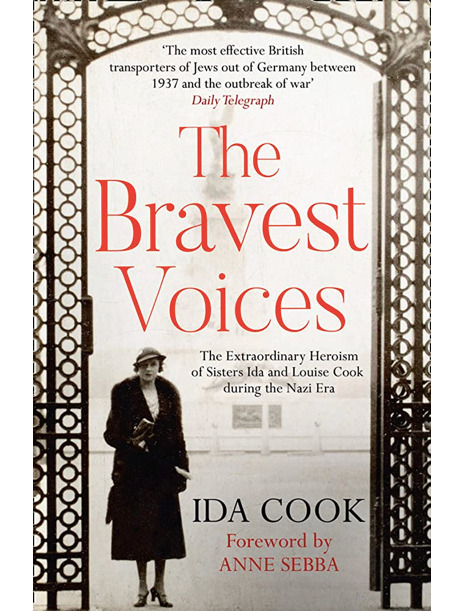

We Followed Our Stars, by Ida Cook. London: Hamish Hamilton, 1950; rev. ed., Toronto: Harlequin, 1976. Reprinted, as Safe Passage: The Remarkable Story of Two Sisters Who Rescued Jews from the Nazis, with a new foreword by Anne Sebba, Toronto: Harlequin, 2008; reprinted again, as The Bravest Voices: A Memoir of Two Sisters’ Heroism During the Nazi Era, Don Mills, Ont.: Park Row Books, 2021.
Overture of Hope: Two Sisters’ Daring Plan That Saved Opera’s Jewish Stars from the Third Reich, by Isabel Vincent. Washington, D.C.: Regnery History, 2022.
As soon as I learned of Isabel Vincent’s book, I knew that it would need to be read with great caution. That feeling was reinforced when I read the “about the author” blurb on the book’s dust jacket. Then I looked at the bibliography, and wondered if I really needed to read it at all. (Here I must stop and thank the collection development, acquisitions, and cataloguing staffs of the Chicago Public Library. This is the second time in less than three years that they’ve purchased a book at my request, and in both cases they’ve managed to put it into my hands in less than a month.)
Why the unease? To begin with, Regnery Publishing’s stable of authors includes Ann Coulter, Ted Cruz, Newt Gingrich, David Horowitz, Sarah Palin, and similar types.
Second, it turns out that Isabel Vincent isn’t a historian: like Lynne Olson, she’s a journalist writing about history. Not only that: Vincent is an investigative reporter for the New York Post! One has to wonder what the phrase “investigative reporter” actually means in the context of that truly filthy tabloid, a jewel in the crown of Rupert Murdoch’s NewsCorp. On the other hand, I must say that Vincent seems far more comfortable using primary sources than Olson does — her research for Overture of Hope included examining 33 archival collections in seven countries. As well, the book carries an endorsement from the historian Blanche Wiesen Cook, who is not exactly a darling of the right.
Finally, the Cook sisters’ story is far from untold. I’ve known of them for at least the past several years, although I’m no longer sure how I learned: I could swear that there was an article about them in Opera News four or five years ago, but I can’t locate it. In any case, as early as 1950 Ida Cook wrote a memoir of their exploits (revising it in 1976), which is why this is a review of two books, not just one. She was the subject of a 1956 episode of This is Your Life. In 1964 Yad Vashem honored the Cook sisters as Righteous Among the Nations. They were interviewed in McCall’s in 1966 (the article was reprinted the same year in The Australian Women’s Weekly). They also inspired an essay in Granta in 2007, and I found a goodly number of other newspaper and magazine articles about them while searching for image files to use in this post.

Ida (at left; 1904-1986) and Louise (1901-1991) Cook seem to me slightly too young to be classed with the hundreds of thousands of British women for whom marriage became, if nothing else, a simple numerical impossibility in the wake of the First World War and the influenza pandemic that overlapped it. Nevertheless, that’s where Vincent situates them. The daughters of a Customs and Excise officer, they had both entered civil service themselves by the end of 1920, as typists. They were then living with their parents and younger brothers in Wandsworth, London, but the family had moved several times while they were growing up. During a stint in Alnwick, Northumberland, they attended The Duchess’ School, where music was one of their exam subjects: Louise was a pianist and Ida was a violinist.
Their passion for opera seems to have come about more or less by accident. One day in 1923 Louise, who worked for the Board of Education, wandered into a lunchtime lecture on music being given on the premises, returned home in a daze, and announced that she simply had to have a gramophone. She proceeded to buy one on an installment plan, along with ten records. (These would have been 78rpm discs, with a single track, three or four minutes long, on each side.) They were mostly of instrumental works, but also included recordings by two sopranos, Amelita Galli-Curci and Alma Gluck.
These quickly eclipsed everything else for the Cook sisters, who pooled their savings to buy the cheapest available tickets to three performances at the Royal Opera House, Covent Garden: they saw Tosca, Rigoletto, and La Traviata, all excellent ways to get started with opera. I was startled to learn that the Covent Garden opera season was only two months long in those days; apparently, the opera house was used as a dance hall during the rest of the year.
When the Cooks learned that Galli-Curci was to give five concerts in London in late 1924 (her first appearances in the U.K.), they bought tickets to all of them. After the first one they wrote her a fan letter, enclosing a handkerchief that Ida had embroidered, and received a letter back by return post, inviting them to come back stage and say hello after the last, which they did.
Having learned in the meantime that Galli-Curci confined her operatic engagements to the Metropolitan Opera, in New York, the Cooks decided that they would travel there to see her perform — and figured out it would take them two years to save up the money that they would need in order to do so. They wrote to Galli-Curci about their plans, and she urged them to contact her when they had an itinerary. She would reserve seats for them, she said. (Galli-Curci's behavior wasn't unusual at the time, at least for singers who could pick and choose their engagements. As late as the 1970s, Dame Janet Baker was appearing in opera only in England, while continuing to tour all over the world as a concert artist.)
And that’s exactly what happened. Their arrival in New York, on January 4th, 1927, attracted the attention of The New York Times; and when they went, as instructed, to Galli-Curci’s agent’s office they found main-floor tickets to several performances waiting for them, along with Galli-Curci’s husband, Homer Samuels (a composer and pianist who was her recital accompanist), who invited them to dinner at their apartment a couple of nights later. They asked the Cook sisters to visit them in Autumn at their home in the Catskills, north of New York City — and that happened as well, though it took another two years of saving to bring it about. Ida’s account of this visit in We Followed Our Stars is not to be missed. She makes it sound like Downton Abbey on a smaller scale. (I feel compelled to add, however, that her description of Catskills social life has absolutely nothing to do with my understanding of what went on there, as recounted by my mother, who spent many summers at Catskills resorts during the 1930s and 40s. See also the films Dirty Dancing and A Walk on the Moon.)
They paid for all of this fun by scrimping and saving, skipping many lunches, and getting up before dawn to join the queue to buy cheap tickets at the Royal Opera House, where they made many like-minded friends and had the opportunity to meet world-class artists arriving for rehearsals. As we’ve seen, they were very outgoing — or at any rate Ida was outgoing and Louise was nearly always willing to follow where her sister led — and by 1934 they had befriended, and been befriended by, Galli-Curci, Ezio Pinza, Rosa Ponselle, Elisabeth Rethberg and — most crucially, in view of what was to come — Viorica Ursuleac and her husband, the conductor Clemens Krauss.
As the years went on, however, a new source of income emerged. Ida Cook was clearly a born storyteller. She had written articles for The Duchess’ School Magazine as a student; in 1928, as an old girl, she sent in an account of her and Louise’s trip to America, which was published, along with an article in the Daily Mail. After the Catskills visit, she sent an article on that experience to Mabs Fashions, a magazine that published sewing patterns, romantic fiction, and non-fiction on whatever topics seemed likely to interest their audience, including travel. This, too, was published, and the editor, a Miss Taft, invited Cook to lunch. (Vincent refers to the Mabs Fashions article, but doesn’t quote from it, as she does from the Duchess’ article, or even supply its title. From this I surmised that Mabs Fashions is poorly documented, and sure enough, WorldCat shows only scattered holdings in fewer than half a dozen libraries in the U.K. I can tell you that it was a monthly, and that it seems to have run from 1924 until some point in the mid-1930s, but much of its contents appear to have been lost to history. That’s a real pity, as it sounds very interesting.) Miss Taft asked Cook to write additional travel articles for the magazine. “Apart from the American journeys, a very short trip to Brussels was the full extent of our foreign travels,” Cook recalled. “But I said, ‘Yes, certainly,’ bought a series of guidebooks and set to work.”
A year or so later Miss Taft offered her a job at Mabs Fashions, as fiction sub-editress. This was a big leap — Cook had a responsible job in the Law Courts, with an assured pension when she turned 60, and in fact had just been promoted — but she decided to take the offer, even though she didn’t know what the position entailed. Her account of this experience is very funny, and I won’t spoil it for you, except to quote her about one part of it: “On press day I was faced with ... adding perhaps five hundred words to a story, without altering its sense, and so that no one could detect the ‘joins’. This was the only part of my work at which I became adept.”
Indeed, she became so adept that after several months the long-suffering Miss Taft asked her to write a story of her own. And then another, and so on. One of them grew into a novel, Wife to Christopher, which appeared in 1936 and was the first of Ida Cook’s more than 120 romantic novels, written over the course of 50 years, all under the name Mary Burchell.
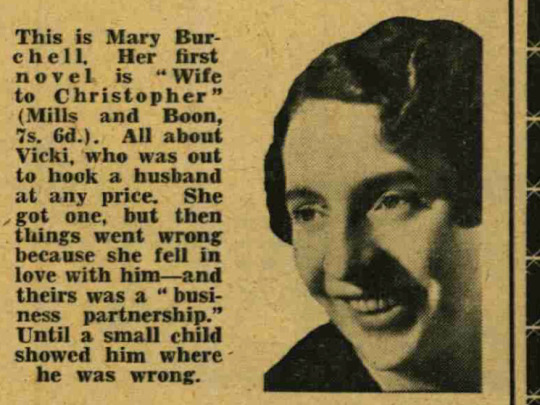
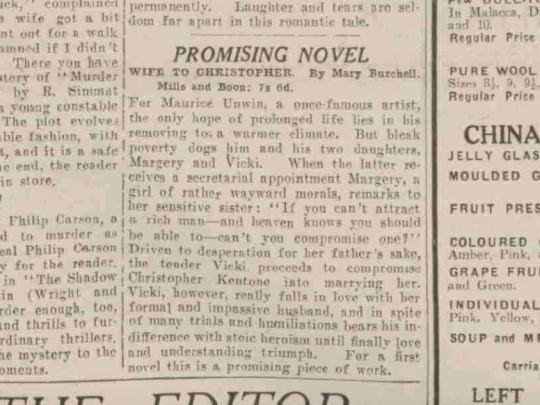
(Above, from the Daily Mail, August 6th, 1936, left, and the Aberdeen Press & Journal, August 12th, 1936. Images ©The British Library Board. All Rights Reserved.)
In short order, she was earning as much as £1,000 per year. That money was going to prove very useful. (All of her novels were published by Mills & Boon, which later became an imprint of the romance giant Harlequin, thus explaining We Followed Our Stars’ reprint history.)
“I realize now that, even though we were in our late twenties, we were not entirely grown up,” Cook wrote of the plans she and her sister had been making during the first half of the 1930s. Indeed, when Englebert Dollfuss, the Austrian chancellor, was assassinated on July 25th, 1934, their main concern was that this might disrupt their planned first visit to the Salzburg Festival. (It didn’t.) They were no more politically aware when, during a visit to Amsterdam near the end of that year, Ursuleac asked them to “look after” a friend of hers: Mitia Mayer-Lismann, a German pianist and educator, who was soon to visit London to give a series of lectures. The Cooks assumed that this meant showing her the sights, which they did. When she asked whether St. Paul’s Cathedral and Westminster Abbey were Protestant or Catholic, they wondered if she was a Catholic and shouldn’t have been taken to see a Protestant church — so they asked.
What they learned was that Mayer-Lismann was Jewish, and it was she who explained the Nuremberg laws to them. Her other purpose in visiting the U.K. was to see if there was any way of moving there with her family. The Cook sisters offered to do what they could to help. The U.K. wasn’t making things easy for would-be refugees from the Nazis (nor was any other country), and half of the Cooks’ work as the decade went on would consist of cutting through reams of red tape. Word of their willingness to do this spread through the Jewish communities of Germany and, later, Austria, keeping the sisters active until just days before war was declared.
The other half of the task was helping those for whom they were able to secure visas to smuggle out whatever portion of their assets hadn’t been seized by the authorities, which by this time consisted mostly of furs and jewelry. This was a genuine cloak-and-dagger operation, if only because it involved making repeated visits to the countries in question at a time when the authorities there were beginning to view British visitors with suspicion. It was at this point that Clemens Krauss got involved: he kept the Cooks informed about when and where he was conducting what, so that when they were questioned at the border they could say that they were going to hear Krauss conduct this opera in that city on that date.
As a side note, Ida’s new prosperity allowed the Cooks to buy a long lease a one-bedroom apartment in Dolphin Square, which had just been built (and where their neighbors included politicians, spies, and Oswald Mosely). Ostensibly, this was so that they would have a crash pad in central London after late nights at the opera. In reality, it served as a dormitory for newly-arrived refugees. Ida recalled that at one point there were twelve people sleeping there.
While Ida seems to have been the family dynamo, Louise’s contributions shouldn’t be overlooked. One of her hobbies was teaching herself languages; she learned German at top speed in 1937 in order to facilitate the sisters’ work. She also put all of her (apparently quite generous) allowance of vacation time during that period into the rescue effort, and also seems to have been the uncredited co-author of, or at least an essential consultant on, Louise’s novels.
At this point I’m going to stop summarizing the Cooks’ story and tell you that if you’re going to read either or both of these books, you should begin with Ida Cook’s memoir, if only because it’s a primary source. It’s also a very useful insight into how an opera buff’s mind works.
Both authors provide their readers with excellent summaries of political events in Germany and Austria between 1933 and 1939 — and both do so without ever talking down to their readers or implying that they shouldn’t need to provide them with this information, which is quite an accomplishment. Cook can be vague about the dates and chronology of personal events, while Vincent simply is vague on music in general and opera in particular, subjects in which she clearly has no genuine interest. (As Fred Cohn points out in his review of Vincent’s book in Opera News — which is how I learned of it; here’s a link, but I’m not sure that it will work for non-subscribers — her subtitle is a complete howler: there were no “stars” among the Cooks’ refugees; in fact, many of the people they helped weren’t involved with music at all. In spite of this, the Library of Congress has classed Overture of Hope as ML (Literature on Music).) As well, Vincent gives short shrift to the war years. (Louise was evacuated to Wales with her office; Ida was an assistant warden in a Bermondsey air-raid shelter, while continuing to write; the Royal Opera House became a dance hall year-round.) On the other hand, she provides us with a firm chronology of the Cooks sisters’ pre-war lives, and she also reveals the hard facts of how the people whose escapes they facilitated fared, which are not happy stories in all cases.
It is also Vincent who relates that Clemens Krauss fared badly in denazification proceedings. Despite his efforts on behalf of his Jewish associates and their families (as well as many complete strangers), he was widely denounced in 1945, and it’s undeniably true that he displayed a Machiavellian streak that led him to consolidate his artistic influence by securing the directorships of both the Vienna and Munich State Operas under the Third Reich. He ended up being banned from conducting for two years, but Vincent documents that just about all of his denouncers were his professional rivals. (The same thing frequently happened in France during the search for collaborators.)
Finally, Vincent quotes extensively from a film treatment that Ida Cook wrote, based on We Followed Our Stars, that is languishing in Joshua Logan’s papers at the Library of Congress. That document needs to be plucked out of purgatory and produced. Right now!
#world war ii#the holocaust#righteous among the nations#first-hand accounts#retrospective accounts#a long post for sunday#lots of history#lots of links#and even some footnotes#oh and this is also about#opera#also#yom hashoah#begins monday evening
7 notes
·
View notes
Text
anyways, in honour of 1 year of honeypre (rip) eos, what were your top stats like at the end of the game? i’ll go first~~~


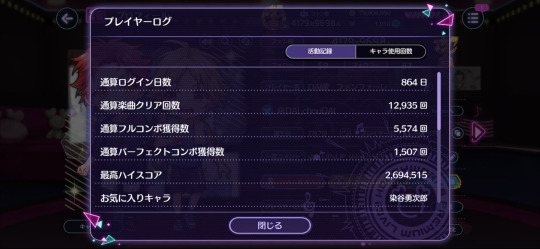
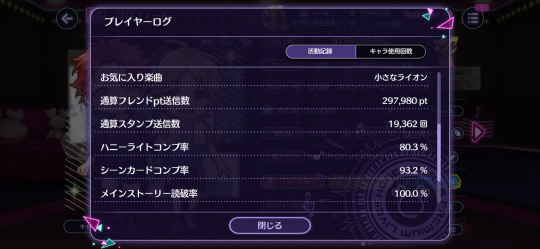
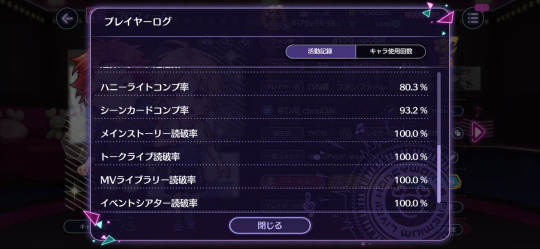
#(look at my pfcs boi)#still miss this stupid game (broken record) it was the one rhythm game i was actually good at lmao#i still think my funniest moment in retrospect was fcing taketori pt 2 with the help of anxiety attack jitters lmaoo#i miss the coloured mvs though. those were fun. and minami’s horrendous guerilla live dances lmfao#can’t believe i was so busy saying goodbye to honeypre that i forgor to set up my sif1 transfer code lmfaooooooo#rip to my very first sif1 account; august 2014-march 2023#rip to my taisho honk ur </3 and my horoscope birthday ur honk </33 and all my ikemen honk srs auuuu#at least sif2 was terminal from the start so the pain isn’t as bad ig. but still. my taisho honk!!!!!!!!!! my 2-3 jellyfish yohanes!!!!#(note that when i say ‘lmfao’ here im actually doing so through tears s o b s)#ah well. come back soon honeypre (pls) you haven’t had the chance to capitalise on kawaikute gomen yet (hint hint)#wait come to think of it chapter 3 of the chizuutan manga is supposedly going up on this other site tomorrow. free preview time~~~~~~#i hope chizuutan throws down with pharmacy boy it’d be fun#just honeypre things
13 notes
·
View notes
Note
I don't think it's okay to use nightow's artwork to make yourself some money selling stickers of it.
While funny edits and memes of official content are commonly made and sold by creators and I understand it is a topic of debate for many reasons, as I say in the post and on the page, it isn't about the money and I think I'd have to sell hundreds to even make much profit! I did a lot of calculations and the price is close to the supplies/costs/the size of the small print run/etc., and while I'm not the best at math, the cents leftover per sticker aren't adding up to much and--again, like I said in the post--will be spent getting leftovers in case of errors if it's enough. If someone chooses to leave a tip for running bookclub, I'm grateful, but a vast majority of people don't and that's fine and what I expect. The point is having fun and celebrating bookclub! The amount of people who wanted a sticker/badge of completion was enough that I really wanted to do something for you guys.
TL;DR: As I said in the original post, this was designed for fun, not money. Transparency is personally very important to me and I try to be as honest as I can whenever possible. Of course, I'm a stranger on the internet, you should take that with a grain of salt, but I do try to be clear about my intentions.
#Ask#If I had the funds to hand these bad boys out for free I would tbh#But it's not even close and I need some way to get them lol#So here we are#Maybe I could have chosen a better printer for a price?#But I had to count on a small run#And so far it seems like it's going to be a pretty small run so that was a smart move#Unless someone orders like. Idk. 100 stickers#In which case r u ok#And then the profit would be used in shipping lol#I also had to shift the base price up a liiiiitle higher to account for international shipping being what it is#And I'm happy I did because folks around the globe are getting theirs!#I am bad at math but I did try very hard#Because I want folks to be able to afford it tbh#Profiting off of them wasn't really a big thought but in retrospect I suppose I should have seen a question like this coming#I'm a wee bit groggy from waking up but wanted to address this asap#So if anyone needs any clarifications hmu#I don't know what kind of money people think I'm making off of $2 stickers and all the crap going into this project lol#But! Honesty and transparency
20 notes
·
View notes
Note
your posts bring tears to my eyes sometimes. what do you mean twitter locked your account for 24 hours for calling james from the nickelodeon show big time rush a whore. that's so funny
IM NOT KIDDING THIS REALLY HAPPENED! this is not even the craziest thing that has happened to me on twitter in terms of getting kicked off the platform lmao
#and this was all pre-phannie account return. tbh i shoulda left back then#cuz like if i was getting locked and suspended idk why i made such an effort to crawl back in :')#but like its now funny in retrospect so its fine lmao
7 notes
·
View notes
Text
The only language studying advice I’ve got that matters much, as in isn’t take or leave (because most advice really depends on the person and their preferences for how to study), is this:
if you study for enough cumulative hours, and are regularly spending study time on some new material that is requiring you to learn something (compared to picking 1 study material and reviewing it but never ever moving onto a new material with unknowns you must learn), you will make progress.
Most people, eventually, will move onto studying something regularly challenging them with new material to learn. Usually when they realize they weren’t learning anything new long enough. (I’m a perfectionist so I perhaps realize slower than some people when I’m reviewing material to the point of refusing to move onto new challenging material that would provide more to new stuff to learn). So for the most part, as long as you just study Enough Hours, you will eventually make progress.
There’s no fancy perfect or ���better’ study method. Maybe there is for you personally. So it could be fun to explore various study methods. But in the end it mostly comes down to time spent studying. So WHATEVER study methods are ones you can do, and keep getting yourself to do, are the BEST ones for you to make progress with. (And its fine to change study methods if it gets you to KEEP studying). Because in the end, its going to be hundreds or thousands of hours you just need to spend reviewing what you’ve learned by practicing with it, and studying new stuff to increase what you know.
People like to argue sometimes that textbook study is best, or classroom study, or tutors, or immersion, flashcards, mnemonics, context learning, drills, audio lessons, etc. Pick whatever you can stick to, change it if you realize now you can get yourself to Do something else easier. If textbooks are something you get yourself to do, then do them. If you refuse to open textbooks you buy, then use something you WILL use more often. Whatever you pick will work if you put in the study hours.
TLDR: the best study methods for YOU are the ones you will do, because the amount of total study time you put in is the biggest thing influencing if you make progress.
Don’t worry too much about if your study method is perfect or if another would be ‘better.’ If you feel like switching it up, have fun. If you feel a method you’d hate looks effective, if you won’t do it then it wouldn’t be effective anyway.
*Note: if you have perfectionist tendencies or tend to stick to trying to master current materials (my worst tendency), my personal suggestion is maybe try to make sure 50% of your study time is spent on something containing Something new and challenging. To make sure you’re regularly making some progress in learning new material. (Examples: if you have read a graded reader then listening to the audiobook would provide at least 1 new thing to challenge yourself and learn - listening skills of those words you read, if you find a new novel chapter with mostly known words but a few new ones - it has some new words to learn and new sentences combinations of words you know, if you are listening to review of something you entirely know and can comprehend in listening then consider trying to shadow the audio so you can challenge yourself with new pronunciation practice, and of course stuff like reading a book/watching a show with a bunch of new words or having a conversation in a new topic would contain new challenging material to learn).
#rant#90% of reddit language forums drama comes down to the arguement of what works 'best'#in reality most people who fail to learn a language fail because they give up before they put 500 hours - 2500 hours into it#so the most important factor of if you will succeed if if you will simply KEEP studying#so pick whatever you'll keep doing!#classrooms/tutors work well for people who like to be held accountable by a teacher#learning by context works well for me because it requires me to run into new material to learn and lets me learn by Doing which is what i#personally prefer. audio lessons work GREAT if you listen to stuff a lot while commuting/exercising#drills work Great if you do them! its just some people refuse to do them so of course they wouldnt work if you arent doing them#learning by reading works but only if you WILL read the amount it requires#and i only mention the *must regularly study something new* part#because as a perfectionist. in japanese i literally reviewed 300 kanji for TWO YEARS STRAIGHT refusing to study anything else out of fear#i wasnt prepared for ANYTHING else until i MASTERED the 300 basic kanji#so u know what happened? i only learned the 300 kanji. nothing else. in tons of hours. in at LEAST 700 hours of study#in retrospect. i know i could have learned at least 2000 words. at least 1000 kanji. at least basic reading ability with a dictionary#in 700 hours. if i had actually regularly been studying new challenging material as at least 50% of my study time#so as a person with perfectionist tendencies. i personally need 50% or more of all study time to always have SOME new content to learn
123 notes
·
View notes
Text
listen, I’m working on it (sub(but not really)george) just soft. Soft and George-centric and sweet. But still smut………….
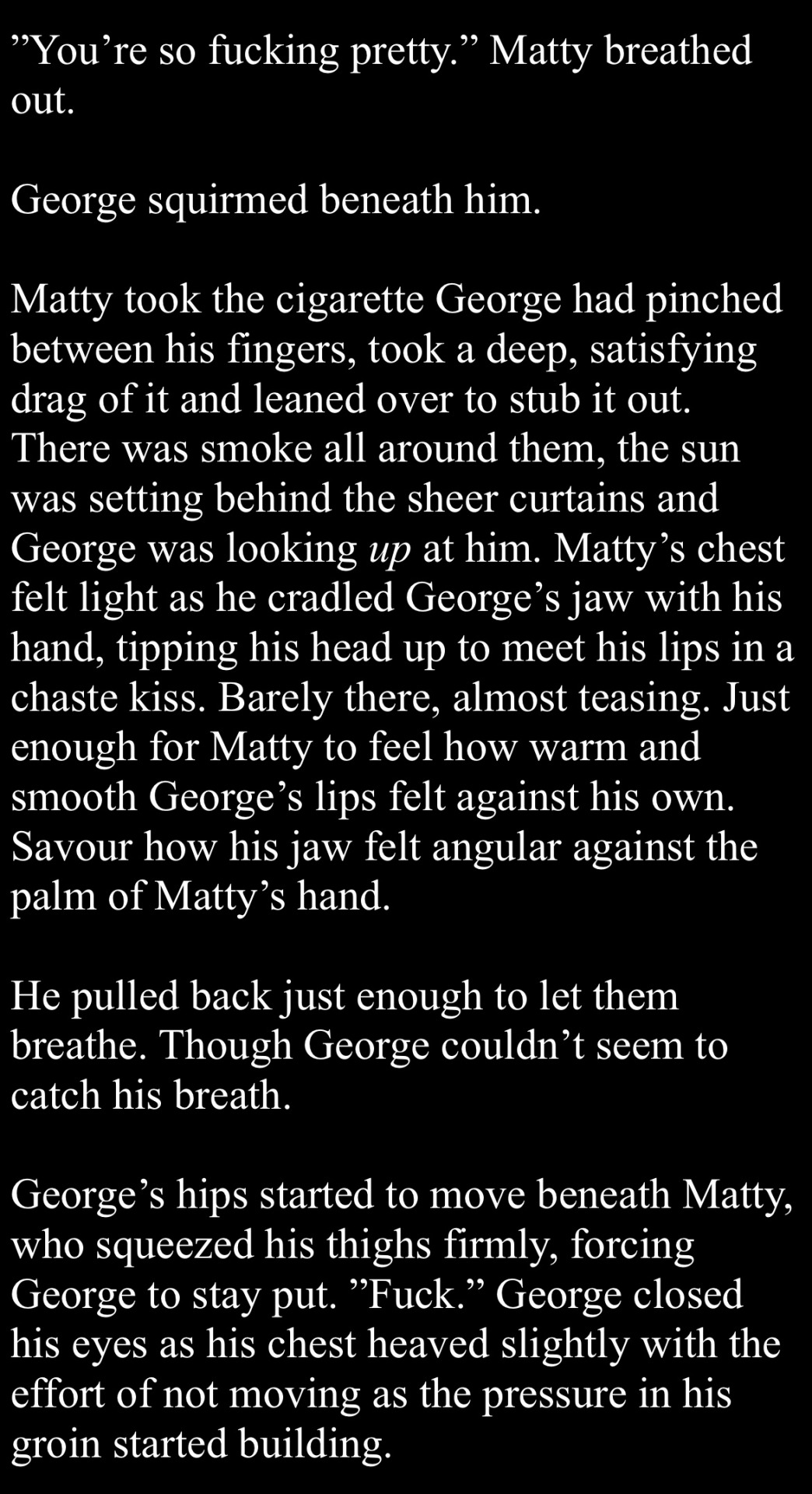
#I cannot seem to come to a natural ENDING???????#like it’s /almost/ there#this is really just the start#except from a slight sentimental retrospective at the start#which is sweet#and I’m keeping some banter (not too much promise) but I NEED it to be them#but here’s to keep myself accountable#but there’ll probably be another month until I’m semi-happy with it#knowing myself#HI!!!!! If ur reading this ilu#TW smut#?????????#sorry#probably should’ve been the first thing I should’ve tagged
4 notes
·
View notes
Text
sorry if this is overly mean but its getting tiring to watch...its ok to get byler doubt im not crucifying people for feelings they cant control but i wish half of the shit you guys get “doubt” from arent over things barely worth agonizing over
#like im usually able to understand byler doubt when its people questioning the narrative/how they’d write it in s5 etc etc#but everytime theres bouts of confidence losses over certain things i get shocked over how tiny they actually are in retrospect#like. a reply from a social media account not even managed by the writers shouldnt be what has you in shambles 😭#also if you’re constantly getting doubt over the smallest things and the slightest turn of events#i feel like maybe that isnt good for your mental heath. like take a break breathe some fresh air idk
9 notes
·
View notes
Text
is it embarassing that i'm starting college and still don't have a driver's license? no actually
#lied im a little bit embarassed but i know i shouldn't be. RANT INCOMING.#screaming into the void that in retrospect it's not my fault and that my parents didn't want me to be independent bc uhhhh controlling :)#like.... more i think abt it as i'm moving out the more i realize that i had no freedom#example. i still don't have a bank account bc they didn't want me to make purchases and thus i don't have venmo and couldn't schedule#anything related to driving permit tests/road tests bc those cost money and i can't pay out of pocket because i don't have said pocket#i had one job in hs and they paid in cash which was perfect but parents made me quit even though i needed the money#uhhh what else. i was barely ever allowed to leave the house to hang out with friends for pure leisure#either i had to have a school related purpose or i was guilt tripped by saying i was choosing outsiders over my family#yeah#and my dad would track my every location lol#also..... I HAVE NEVER SLEPT A NIGHT AWAY FROM MY PARENTS!!! THEY NEVER LET ME DO ANY SLEEPAWAY CAMPS OR SLEEPOVERS OR STAY OUT PAST 10#OKAY LIKE LITERALLY HOW AM I SUPPOSED TO GO OUT AND DO THINGS ON MY OWN IN COLLEGE WITHOUT FEELING WEIRD... I HAVE NEVER HAD FREEDOM!!!#in short i am dependent in the literal sense of the word and im also scared
6 notes
·
View notes
Text
(( ooc so I haven't posted here since April 4th bc I got so burnt out - but hopefully I'll be returning here soonish! Current plan is to just focus on this account, @groundskeeperosha and @highlandswarden and not. All of the accounts I have lmao. I'm still not quite up to returning so I'm gonna be working on like, a Lore/Storyline recap to get back into the swing of things, I think.
I might start off interacting again with Ingo/@highlandswarden just because I'm in a Big Submas/Pokemon Mood rn. Gotta play to my interests to conserve energy and all that
So uh yeah, hopefully I'll be back around soon enough. The future is, however, unwritten, so I cannot give any guarentees. Maybe I'll suddenly get really into metalurgy or something and get distracted. Who's to say?
Anyway uhhhhh, have a good day, experience joy, hydrate etc
#not janitor#janitors log#oshafam#oshaverse#(( not mentioned in this post; my fear of logging into my main since that's where i had all my pokeirl accounts#I fear the amount of notifs i have for the blog i made to try and list all the accounts#In retrospect that was probably what caused me to burn out lol. way too much all at once
2 notes
·
View notes
Text
My 2023 Tumblr Intermediate Top 10
1. 188 notes - Feb 27 2023
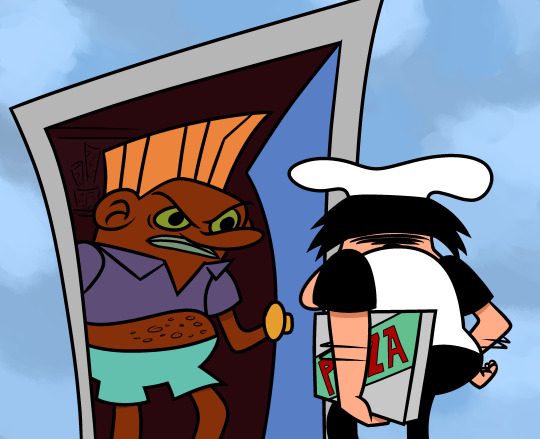

2. 44 notes - Feb 18 2023

3. 44 notes - Jan 21 2023
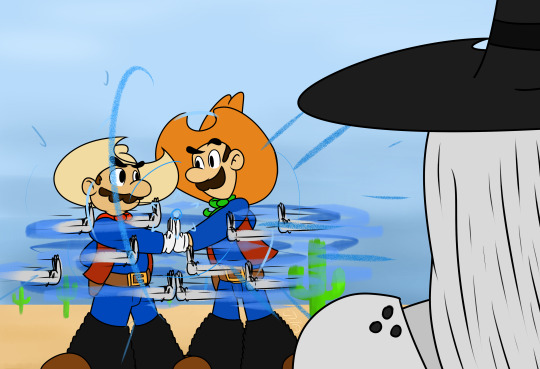
4. 19 notes - May 13 2023



5. 19 notes - Apr 12 2023

6. 18 notes - Jun 22 2023

7. 17 notes - Jan 19 2023
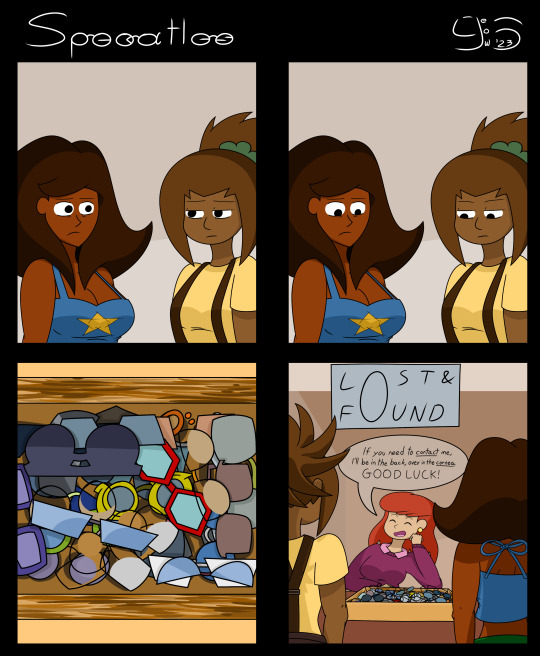
8. 15 notes - May 6 2023

9. 14 notes - May 14 2023
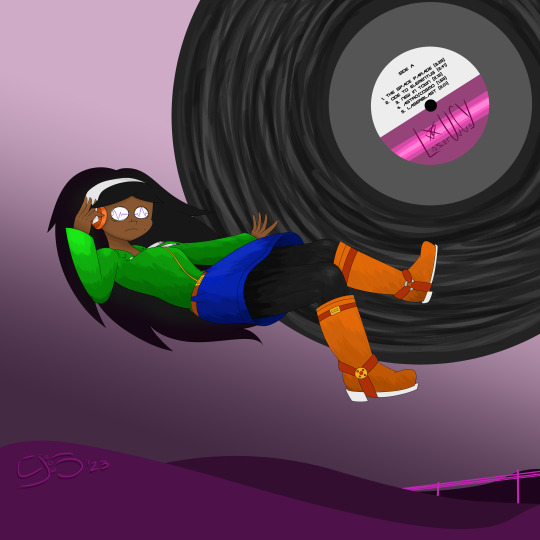

10. 12 notes - May 27 2023

Partially created by TumblrTop10
Not much to say about this one beyond a few milestone breaches. This is the first time all of the art featured in this intermediate top 10 have more than ten notes; and the first time all of the top three have more than 20 notes. And of course, the Pizza Tower/SpongeBob fanart at the top is to date my most popular art on this site (from what I remember, it hit 100 notes in less than 48 hours; which for me is a legit record). Which is pretty cool. It’s also one of my most popular pieces over at dA and Twitter; though Twitter was much more enthusiastic about the Daisy art at #8.
Previous Intermediate TumblrTop10s: 2022 - 2021
#tumblrtop10#tumblr top 10#tumblr top ten#2023#2023 in review#2023 in intermediate review#art summary#art retrospective#intermediate art summary#intermediate art retrospective#long post#i tried adding a keep reading bar so it could easily be scrolled past#but it didn't look right when i tried reblogging it to my main account#ah well
2 notes
·
View notes
Note
What, was "boldandbrash" taken? A har har har
Look, Anon, my pal, my beloved, my sweet sap on the tree of camaraderie. We're all friends here and I hope you understand that with your full heart, but if I find out that your true name behind the mask is that what you taunt and flaunt me with?
It's on sight.
#aynonie moose time#but for realsies belongsinthetrash WAS actually the name I went with first when this was just a burner lurker account#in retrospect i'm very lucky to have pilfered this name while this was open AND have sat upon it without any future thoughts
6 notes
·
View notes
Text
Wordvomit retrospective ahead:
When I was in school, primarily younger years (4th-7th grade, really) I was deeply, DEEPLY involved in a small section of the Wattpad roleplay community. First thing to address is that, yes, I lied about my age like it was my job. I was good at it, but then again, that's what everybody says. Maybe nobody called me out for it because they liked me, not because I was a master sleuth at the age of eleven.
For a few years, my big thing was THE SELECTION! Spoiler, I never read the books, but everyone always thought that I did because of how I would write. I am the "read the dictionary for fun" kind of autistic, which lead me to become a "read the dictionary for fun" kind of roleplayer. Of course, that took me a long while. But my final REAL roleplay, Nana, felt like some kind of monumental era for me. Literate, descriptive, I became one hell of a writer because of these roleplays. Hell, even as I look back now (four years later? almost five?) that writing, while flawed, laid a groundwork for my future growth. I created OCs that still exist in my mind and, on the rare occasion, in my newer writing.
Socially, Wattpad was incredibly important to me. At a time where I had few-to-no friends, I connected with people from all around the world. At my most suicidal, I shared a common goal with people that I loved: Tell the story. Amber, T.K, these are aliases that I cannot think about without separating them from this pivotal time of my youth. I am almost bitter that I lied about my age when, in some cases, my peers were only two years my senior. Because of my zeal to fit in, I've put myself in a place where I can no longer share my life with these people.
Neither of us use the platform any more. Not only because it has changed, but because we've changed to. I wish I could tell Summer that I still, to this day, use ideas from her beautifully unique plot in my own writing, or to tell her sister that a piece I wrote following Santiago and Remy won me a state award. I wish Amber knew how much she meant to me, a young kid who couldn't communicate properly unless it was through the comment sections of her books.
I love these people. I miss them dearly, even though I know they aren't too far away. I just wish they knew me, and not my username. I have so much more to say. I may just dump it all here.
#retrospective#vent#sad topics#wattpad#childhood#NANA changed my brain forever tbh#i'm not sad about this though#i wish i had it now#i loved them#ugh#-typicalstory- will be missed#because i can't login to that account anymore lmao#i don't remember my first account's username#god i really grew up online didn't i#ipad kid#lmao
4 notes
·
View notes
Text
I would sometimes like people to think a little bit more critically about why they’re implementing a feature to block certain extremely unpleasant people from accessing Minecraft permanently before they start installing third party mods designed to remove safety features meant for kids
#those online boogeymen that your parents may or may not have told you about?#yeah!! they do actually exist#like i truly do implore you to think about all your online experiences#ESPECIALLY people like me who gained near unbridled internet access#and realize in retrospect as an adult how fucked up some them were#people gripe and complain about how youths get access to smartphones and Tiktok and Instagram by NINE and says it’ll damage them#and then turn around and say ‘features designed to protect the minors that WILL play a block game are stupid and harsh my vibe’#do you guys not know about how easy to it to access alt Minecraft accounts?#how easy it is to circumvent a server IP ban?#and honestly?? I got plenty of people I’ve met over the years who I would have LOVED to perm ban for this stupid game#and YES the current system needs quality assurance tweaking and feedback it’s FRESH and not 100% secured in place#I’m tired of monologuing in the notes and if anyone wants an explanation I’ll be glad
3 notes
·
View notes
Text
Thinking about how I technically have a call out post for saying that I thought the Queen of England would be an avatar of the web rather than the slaughter and this was something I was upset about.
#I deadass do NOT remember how this came up#also the person i was disagreeing with was one of the mods#and one of the problems was that we were even talking about it in the first place#but the mod that snarked at me over it was also saying i shouldn't have had the conversation in the first place#like okay go off#i admit it was a stupid conversation to have and in retrospect a little tasteless#but are you fucking kidding me#well technically the call out post was for leaving the discord server afterwards without like#addressing it or 'taking accountability'#which is. insane. but now i have anxiety over leaving servers.#as well as getting lectured by mods#well i say anxiety#i have anxiety about the former#i have trauma around getting lectured by mods#which is. fantastic and not at all inconvenient.#and it's not actually a post#at least as far as i know? i'm still kind of in hiding from these people#this might be a#vent#idk#this was like#about the same time as i deleted my last tumblr#tbh if anything goes suuuper wrong with the current group of discords i'm in#which is the way it feels like it's going#i may panic and delete this account and if i do please don't worry about me i'll be fine#i just. when it comes to social drama#i have learned to run away when faced with any challenge for fear of making it worse and hurting people's feelings#WOW that got heavy
3 notes
·
View notes
Text
gawd i am just now coming out of a full 3 weeks of victorian boy levels of sickness. it's so weird feeling like a person again and eating things with flavors other than Salt and mayhaps Pepper if i was feeling adventurous.
#maddie meows#it is gerd an ulcer or both i am fairly sure#on account of having many symptoms of both and all my other tests coming back 100% normal and ppis helping#the testing process was kind of funny in retrospect bc i would get a ton of blood drawn#and then get like 10 results back that were all “you are sooo normal you have the normalest blood we have ever seen”#as i spent another day in bed unable to eat anything more complex than a potato
1 note
·
View note
Text
just saw a post about how normal people aren't equipped for internet fame, no one teaches you how to deal with going viral, ordinary bloggers don't have PR teams, etc
it was a nice post, but it drove me nuts in the same way that otherwise empathetic disability posts that posit [some mythical neurotypical that doesn't have those issues at all] drive me nuts – actually famous people are not equipped for internet fame. You could be the richest person in the world and the harassment of millions will drive you almost literally insane. Check out this not-even-that-famous guy's account on what his life became:
internet hate is utterly unsolveable and horrifically bad, and the implication that it's okay to do it to people "if they have a PR team" disgusts me. Unless you have an atypically strong personality, material resources won't make more than a big dent. There's no fucking follower count after which psychotic treatment of them becomes fine
The notion that any material or human resource can protect you from the downsides of visibility-to-millions is fantasy. The notion that we can do it to other human beings without guilt is an even uglier fantasy.
If you have a public figure you loathe, and it seems fine and good that they get death threats for their repulsive behavior, I believe you've made them worse.
3K notes
·
View notes